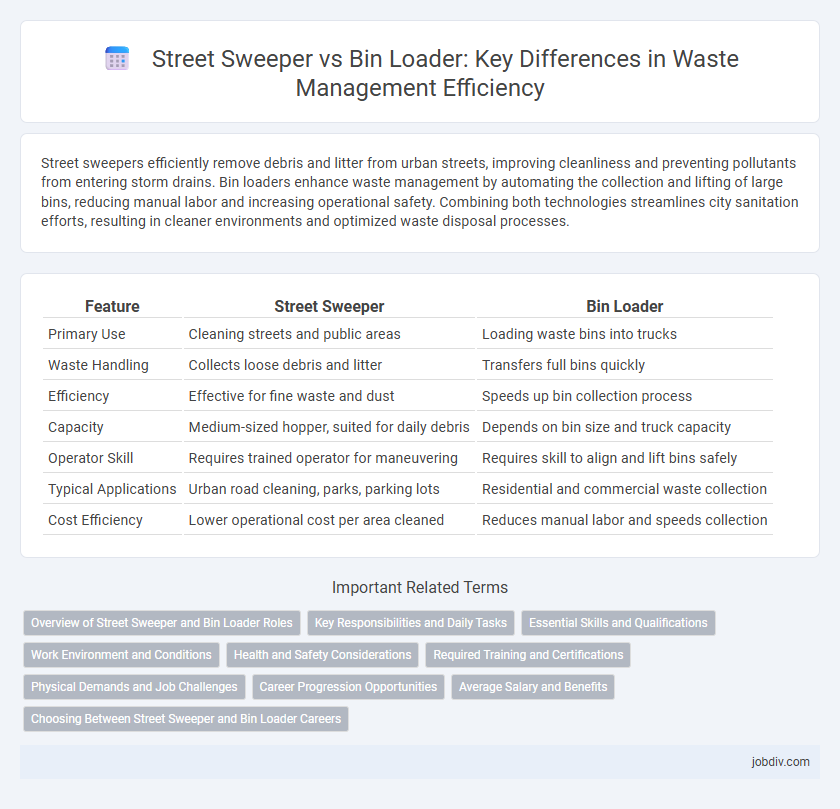Street sweepers efficiently remove debris and litter from urban streets, improving cleanliness and preventing pollutants from entering storm drains. Bin loaders enhance waste management by automating the collection and lifting of large bins, reducing manual labor and increasing operational safety. Combining both technologies streamlines city sanitation efforts, resulting in cleaner environments and optimized waste disposal processes.
Table of Comparison
| Feature | Street Sweeper | Bin Loader |
|---|---|---|
| Primary Use | Cleaning streets and public areas | Loading waste bins into trucks |
| Waste Handling | Collects loose debris and litter | Transfers full bins quickly |
| Efficiency | Effective for fine waste and dust | Speeds up bin collection process |
| Capacity | Medium-sized hopper, suited for daily debris | Depends on bin size and truck capacity |
| Operator Skill | Requires trained operator for maneuvering | Requires skill to align and lift bins safely |
| Typical Applications | Urban road cleaning, parks, parking lots | Residential and commercial waste collection |
| Cost Efficiency | Lower operational cost per area cleaned | Reduces manual labor and speeds collection |
Overview of Street Sweeper and Bin Loader Roles
Street sweepers are specialized vehicles designed to clean streets by removing debris, dirt, and litter, enhancing urban sanitation and preventing waterway pollution. Bin loaders are machinery used to lift and empty large waste bins into collection trucks, streamlining the waste collection process and improving operational efficiency. Both play crucial roles in effective waste management by maintaining cleanliness and facilitating timely garbage disposal.
Key Responsibilities and Daily Tasks
Street sweepers are responsible for cleaning roadways by removing debris, litter, and dust using mechanical brushes and vacuum systems. Bin loaders focus on lifting and emptying large waste bins into collection trucks, ensuring efficient waste transfer and minimizing manual handling. Both roles require routine equipment inspection and maintenance to maintain operational efficiency and safety standards.
Essential Skills and Qualifications
Operating a street sweeper demands proficiency in handling heavy machinery, knowledge of urban road layouts, and an understanding of environmental regulations to ensure efficient debris removal. Bin loader operators require skills in maneuvering hydraulic loading systems, safety protocols to prevent accidents during bin collection, and physical fitness to manage repetitive lifting tasks. Both roles benefit from a strong commitment to maintenance, attention to detail, and the ability to work in diverse weather conditions to maintain cleanliness and waste management standards.
Work Environment and Conditions
Street sweepers operate in outdoor urban environments, exposed to varying weather conditions, traffic, and noise, which can impact operator comfort and safety. Bin loaders typically work in mixed environments, including confined spaces such as alleys and loading docks, requiring maneuverability and awareness of nearby pedestrians and obstacles. Both roles demand ergonomic considerations to minimize physical strain during repetitive tasks and extended periods of operation.
Health and Safety Considerations
Street sweepers reduce airborne dust and debris, minimizing respiratory hazards for workers and pedestrians, while bin loaders pose risks related to heavy machinery operation and potential crushing injuries. Proper maintenance and operator training are critical for both to ensure safe handling and reduce accident rates. Protective equipment and safety protocols must be rigorously enforced to mitigate exposure to contaminants and mechanical hazards.
Required Training and Certifications
Operating a street sweeper requires specialized training in handling complex machinery and navigating urban environments, often including certification in heavy equipment operation. Bin loader operators must complete safety training specific to lifting and loading techniques, typically involving certification in forklift or loader operations to prevent workplace injuries. Both roles demand adherence to occupational safety standards and environmental regulations to ensure efficient and compliant waste management.
Physical Demands and Job Challenges
Street sweepers require extensive physical stamina to operate heavy machinery over extended periods while navigating uneven urban terrain, often exposing workers to dust and noise hazards. Bin loaders face intense physical demands from repeatedly lifting and maneuvering heavy waste bins, increasing the risk of musculoskeletal injuries due to awkward postures and repetitive motions. Both roles involve weather exposure, but bin loaders experience more direct manual handling risks, whereas street sweepers manage equipment operation challenges and urban traffic safety concerns.
Career Progression Opportunities
Career progression in waste management shows that street sweepers often start with entry-level roles focusing on urban cleanliness, providing foundational industry knowledge. Bin loaders offer advancement opportunities due to their involvement in machinery operation and waste handling, skill sets that lead to supervisory or equipment maintenance positions. Developing expertise in equipment functions and waste logistics opens pathways to higher roles such as fleet management or waste operations coordination.
Average Salary and Benefits
Street sweeper operators earn an average salary ranging from $30,000 to $45,000 annually, with benefits often including health insurance, paid leave, and retirement plans. Bin loader operators typically receive a slightly higher average salary between $35,000 and $50,000 per year, reflecting the physical demands and machinery operation expertise required. Both roles frequently provide essential employee benefits such as overtime pay, job stability, and opportunities for advancement within waste management services.
Choosing Between Street Sweeper and Bin Loader Careers
Choosing between careers as a street sweeper and a bin loader requires evaluating job responsibilities, physical demands, and growth opportunities. Street sweepers operate specialized machinery to clean urban roads, offering more technical skill development, while bin loaders focus on manual waste handling, emphasizing physical endurance and teamwork. Understanding the work environment, injury risk, and advancement potential in waste management roles helps candidates align their career goals with industry needs.
Street Sweeper vs Bin Loader Infographic

 jobdiv.com
jobdiv.com